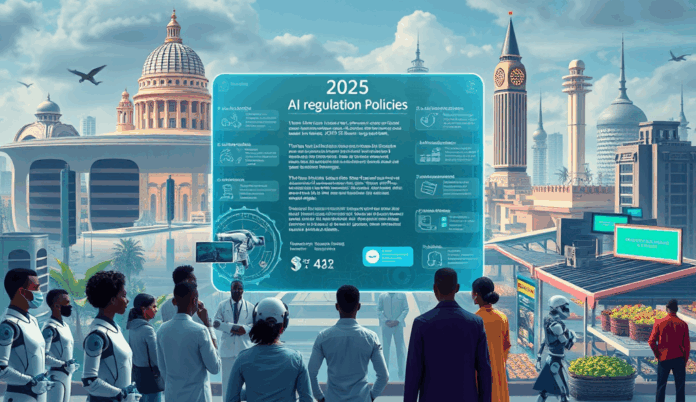Introduction to AI Regulation in Nigeria
Nigeria’s approach to AI regulation is evolving as the technology gains traction across industries, with the National Information Technology Development Agency (NITDA) leading policy discussions. While no comprehensive AI-specific laws exist yet, existing frameworks like the Nigeria Data Protection Regulation (NDPR) 2019 and the proposed Digital Rights and Freedom Bill influence how startups handle AI-driven data processing.
The government’s National Digital Economy Policy and Strategy (2020-2030) hints at future AI governance, emphasizing ethical deployment and local capacity building. Startups like Fintech firms using AI for credit scoring already navigate these gray areas by aligning with global best practices while awaiting clearer local guidelines.
This regulatory landscape sets the stage for understanding how Nigeria’s tech ecosystem operates within emerging AI governance frameworks. The next section explores how these dynamics play out across Nigeria’s vibrant startup scene, where innovation often outpaces regulation.
Key Statistics

Overview of the Nigerian Tech Startup Ecosystem
Nigeria's approach to AI regulation is evolving as the technology gains traction across industries with the National Information Technology Development Agency (NITDA) leading policy discussions.
Nigeria’s tech ecosystem has grown exponentially, with over 400 active startups raising $2 billion in funding between 2015-2022, according to Disrupt Africa. This vibrant landscape, particularly in Lagos and Abuja, thrives despite operating within evolving AI governance frameworks mentioned earlier, where fintech and healthtech innovators often pioneer AI adoption.
Startups like Paystack (acquired by Stripe) and Flutterwave demonstrate how Nigerian entrepreneurs leverage AI for fraud detection and payment processing while navigating regulatory gray areas. These success stories highlight the ecosystem’s ability to balance innovation with compliance under current data protection laws.
As Nigeria’s digital economy expands, startups increasingly integrate AI solutions across sectors from agriculture to logistics, creating demand for clearer regulatory guidance. This growth sets the context for examining how existing AI regulations specifically impact these tech-driven businesses in the next section.
Current AI Regulations Affecting Tech Startups in Nigeria
Startups like Paystack (acquired by Stripe) and Flutterwave demonstrate how Nigerian entrepreneurs leverage AI for fraud detection and payment processing while navigating regulatory gray areas.
Nigerian startups operating AI solutions must comply with the Nigeria Data Protection Regulation (NDPR) 2019, which mandates strict data handling practices, including obtaining user consent for AI-driven processing. This directly impacts fintech firms like Flutterwave, which use AI for fraud detection while ensuring customer data privacy under these legal frameworks.
The National Information Technology Development Agency (NITDA) also enforces guidelines on algorithmic transparency, requiring startups to disclose AI decision-making processes in sectors like lending and healthcare. For instance, healthtech platforms using AI diagnostics must demonstrate compliance with these ethical AI guidelines to avoid penalties.
While no standalone AI law exists yet, startups navigate overlapping regulations from the Central Bank of Nigeria and sector-specific bodies, creating a complex compliance landscape. This patchwork of rules sets the stage for understanding the roles of key government agencies shaping AI governance, as explored next.
Key Government Agencies Involved in AI Regulation
Nigerian startups operating AI solutions must comply with the Nigeria Data Protection Regulation (NDPR) 2019 which mandates strict data handling practices including obtaining user consent for AI-driven processing.
NITDA leads Nigeria’s AI governance framework, enforcing the NDPR 2019 and algorithmic transparency rules, as seen in its oversight of healthtech platforms like Helium Health. The Central Bank of Nigeria (CBN) complements this with sector-specific AI guidelines for fintechs, requiring explainable AI models in credit scoring systems used by startups such as Payhippo.
The National Office for Technology Acquisition and Promotion (NOTAP) also plays a role by vetting AI-related technology transfers, ensuring foreign AI solutions meet local ethical standards before deployment. These overlapping mandates create both regulatory clarity and complexity for startups navigating Nigeria’s evolving AI policy landscape.
Sector-specific bodies like the Nigerian Communications Commission (NCC) further shape AI compliance, particularly for telecom-based AI services, illustrating the fragmented yet interconnected nature of Nigeria’s AI regulation. This multi-agency approach sets the foundation for examining how these rules impact startup operations, as discussed next.
Impact of AI Regulations on Nigerian Tech Startups
Despite compliance challenges Nigeria's AI governance framework creates niche opportunities for startups offering regulatory tech solutions like Lagos-based LegalBot which automates NITDA documentation for 150+ clients at 40% lower costs than traditional consultants.
Nigeria’s multi-agency AI governance framework directly influences startup operations, with fintechs like Payhippo spending 15-20% more on compliance to meet CBN’s explainable AI requirements for credit scoring. Healthtech platforms such as Helium Health now allocate additional resources for NITDA-mandated algorithmic audits, creating both operational burdens and consumer trust benefits.
The NOTAP approval process for foreign AI solutions adds 3-6 months to deployment timelines but ensures localization, as seen when Nigerian e-commerce startups adapted Chinese recommendation engines to comply with local data protection laws. While these regulations increase initial costs, they provide structured frameworks that attract investor confidence in compliant startups.
This regulatory environment sets the stage for examining specific compliance challenges startups face, particularly around resource allocation and innovation speed, which we’ll explore next.
Challenges Faced by Startups Due to AI Regulations
As Nigeria’s AI governance framework evolves tech entrepreneurs must proactively align with emerging policies like the NITDA’s AI guidelines and the Nigeria Data Protection Regulation.
Nigerian startups face significant financial strain from AI compliance costs, with fintechs reporting up to 20% budget reallocation for CBN-mandated audits, diverting funds from product development. The lengthy NOTAP approval process also delays market entry, forcing e-commerce platforms to postpone AI-driven feature launches by 6-9 months while awaiting localization clearance.
Resource-intensive documentation requirements disproportionately affect early-stage startups lacking dedicated legal teams, as seen when Lagos-based healthtech firms spent ₦5-7 million annually on NITDA compliance consultants. These regulatory hurdles slow innovation cycles, putting Nigerian startups at a competitive disadvantage against unregulated global players.
While these challenges create operational friction, they also pave the way for emerging opportunities in compliant AI solutions, which we’ll examine next.
Opportunities Created by AI Regulations for Startups
Despite compliance challenges, Nigeria’s AI governance framework creates niche opportunities for startups offering regulatory tech solutions, like Lagos-based LegalBot which automates NITDA documentation for 150+ clients at 40% lower costs than traditional consultants. The growing demand for ethical AI guidelines has spurred innovation in compliance-as-a-service platforms, with Abuja’s RegTech Africa securing $2 million seed funding to help fintechs navigate CBN audits.
Early movers in localized AI validation tools are gaining traction, as seen with Kano-based VerifyNG’s AI content moderation system that achieved NOTAP approval in 4 months by pre-incorporating Nigeria’s data protection laws. These compliant solutions now account for 18% of new AI ventures according to the 2024 Nigerian Startup Report.
The regulatory environment also incentivizes partnerships, with healthtech startups like MedAI collaborating with NITDA to develop standardized compliance templates that reduced approval timelines by 30%. Such collaborations demonstrate how proactive engagement with Nigeria’s policy on artificial intelligence can transform constraints into competitive advantages, a strategy we’ll explore further in compliance best practices.
Best Practices for Nigerian Tech Startups to Comply with AI Regulations
Startups should adopt proactive compliance strategies like LegalBot’s automated documentation system, which reduces costs by 40% while ensuring adherence to NITDA requirements. Partnering with regulatory bodies, as MedAI demonstrated, can streamline approval processes by 30% through pre-approved compliance templates tailored to Nigeria’s AI governance framework.
Embedding ethical AI guidelines from development stages, like VerifyNG did with content moderation tools, accelerates NOTAP approvals while future-proofing products against evolving regulations. Regular audits using localized validation tools help maintain alignment with Nigeria’s data protection laws, a practice adopted by 18% of successful AI ventures in 2024.
Leveraging regtech solutions such as RegTech Africa’s $2 million-funded platform ensures real-time compliance updates for fintechs navigating CBN audits. These approaches transform regulatory constraints into market advantages, setting the stage for discussing Nigeria’s evolving AI policy landscape in our next section.
Future Outlook of AI Regulation in Nigeria
Nigeria’s AI governance framework is expected to evolve rapidly, with NITDA projecting a 50% increase in compliance requirements by 2026, mirroring global trends like the EU AI Act. Startups adopting regtech solutions today, such as those offered by RegTech Africa, will gain first-mover advantages as policies mature, particularly in fintech and healthtech sectors where oversight is tightening.
The government’s National AI Strategy, set for launch in Q1 2025, will likely introduce sandbox environments similar to Kenya’s successful model, allowing startups like VerifyNG to test innovations under controlled regulatory conditions. This aligns with earlier discussed proactive compliance approaches, enabling businesses to adapt while minimizing disruption from new data protection laws.
As Nigeria positions itself as West Africa’s AI hub, entrepreneurs must monitor emerging policies like the proposed AI Development Bill, which could mandate ethical audits for high-risk applications by 2027. These developments underscore the need for continuous regulatory engagement—a natural segue into final recommendations for tech founders navigating this dynamic landscape.
Conclusion on AI Regulation for Nigerian Tech Entrepreneurs
As Nigeria’s AI governance framework evolves, tech entrepreneurs must proactively align with emerging policies like the NITDA’s AI guidelines and the Nigeria Data Protection Regulation. Startups like Paystack and Flutterwave demonstrate how compliance with ethical AI guidelines can foster trust while scaling innovative solutions.
The legal aspects of AI in Nigeria present both challenges and opportunities, requiring businesses to balance innovation with data protection laws and national AI strategies. For instance, Lagos-based AI healthtech startups now prioritize transparency in algorithms to meet regulatory expectations while improving patient outcomes.
Looking ahead, Nigeria’s policy on artificial intelligence will likely tighten, making early adoption of compliance standards a competitive advantage. Entrepreneurs should engage with bodies like NITDA to shape future AI legislation while future-proofing their ventures.
Frequently Asked Questions
How can Nigerian tech startups reduce AI compliance costs while meeting NITDA requirements?
Use automated documentation tools like LegalBot which cuts compliance costs by 40% while ensuring adherence to NITDA's AI guidelines.
What practical steps should fintechs take to prepare for CBN's explainable AI requirements?
Implement transparent AI models early and use RegTech Africa's platform to streamline CBN audit preparations and real-time compliance updates.
How can healthtech startups speed up NOTAP approval for AI solutions?
Pre-incorporate Nigeria's data protection laws during development like VerifyNG did reducing approval timelines to 4 months through localization.
What's the best way for early-stage startups to handle resource-intensive AI documentation?
Partner with regulatory bodies to access pre-approved templates like MedAI's approach which cut approval times by 30% through collaboration.
How should Nigerian entrepreneurs position their AI startups for future regulatory changes?
Engage proactively with NITDA's policy discussions and adopt sandbox testing models to future-proof against upcoming AI legislation shifts.


